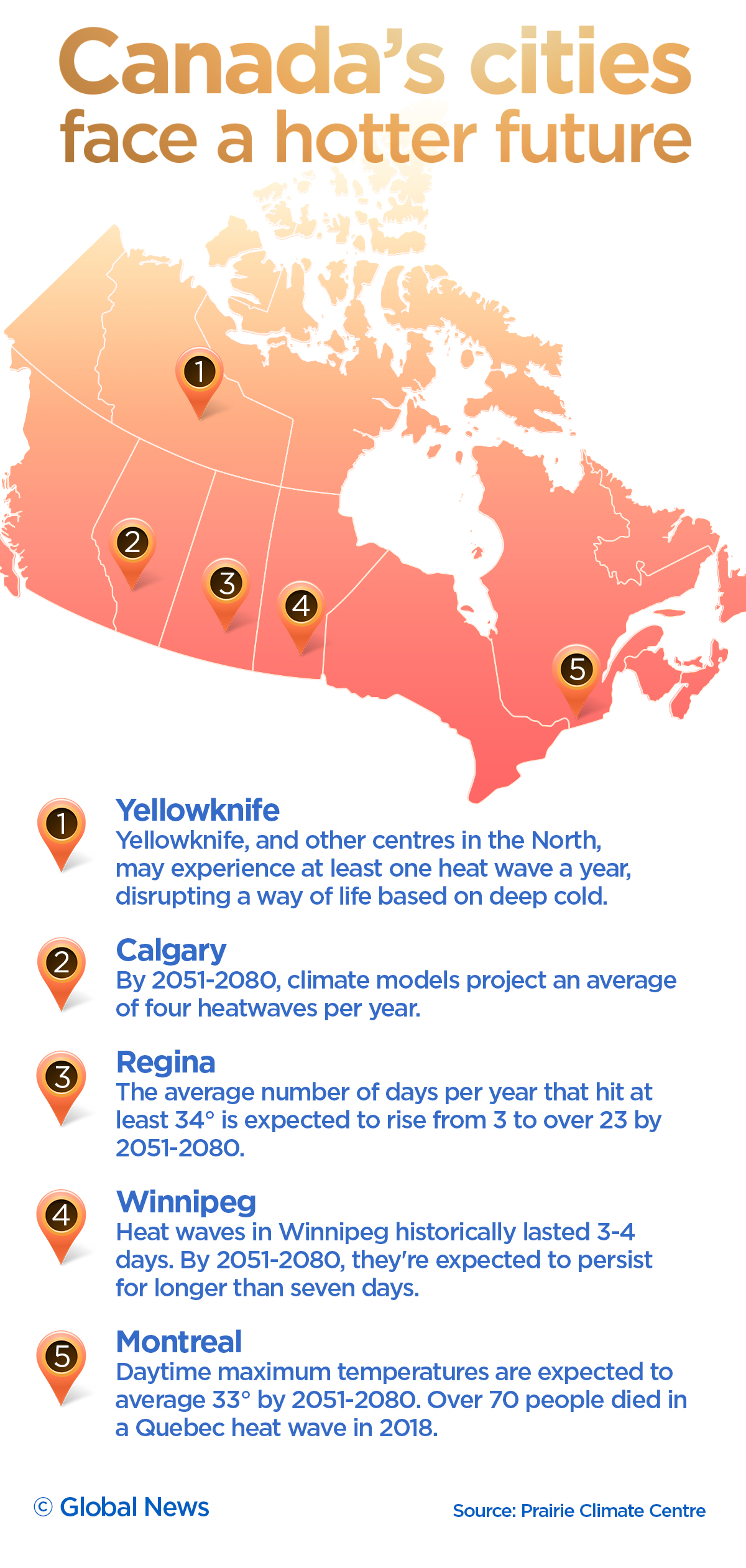Canada’s future includes longer and more intense summer heat waves, scientists at the University of Winnipeg warn.

And that means an array of problems, from health issues for city-dwellers and power generation to agriculture and wildfires, a report released Wednesday says.
The report, published by the university’s Prairie Climate Centre, looked at the effects of heat waves on health.
“We are going to have longer, hotter and more frequent heat waves in the future,” says geography professor Ian Mauro.
“Heat can affect cardiovascular health, heat can affect respiratory health, heat can affect mental health. It’s a really critical thing to be talking about, because we know that these heat waves are going to increase in frequency, duration and intensity moving forward.”
The report defined a heat wave as a period of three days over 30° Celsius.
In late June, European cities saw a punishing heat wave that broke records across the continent.

Last summer, a heat wave in Quebec killed as many as 70 people. Most were men over 53 in Montreal living without air conditioning.
A death toll on that scale is unusual in Canada (though there was a suggestion that Quebec was quicker to announce heat-related deaths than Ontario).
The report looked at three areas.
Health of city-dwellers
Concrete in big cities heats up during the day and holds much of its heat during the night, making heat waves harsher for city-dwellers.
“The urban heat island effect is essentially that these large urban spaces with concrete and all kinds of activities have a greater temperature taking place than the surrounding area,” Mauro says.
“It’s the city you’re in that’s holding that heat around you. The concrete absorbs that heat and holds it there.”
High temperatures can also lead to smog, which is bad for residents’ hearts and lungs.
And it can also harm mental health. As tempers shorten, some can be quicker to lash out physically. Heat waves have been shown to lead to crime waves.
“When we’re in that hot, oppressive heat, it can spur all kinds of social and mental health responses that can lead to unhealthy outcomes. Heat is just a risk multiplier, in a sense,” Mauro says.
“It can increase the potential for conflict.”
People with mental health issues, who may be socially isolated, are in more danger during heat waves.

Drought
Heat waves are connected to periods of drought.
Drought can lead to more wildfires which, with dust from dry soil, make it harder to breathe.
Less obvious, it can also make it harder to generate electricity — two-thirds of Canada’s power is hydroelectric. And nuclear plants, which need water to run safely, may have to be shut down if there isn’t enough. In turn, the use of fossil fuel to make electricity, for lack of any alternative, worsens air quality.
A period of hot, dry weather can both increase demand for power while also making it harder to generate.
“It’s a serious thing to think about,” Mauro says. “When we get into a situation where multiple risks are confronting us simultaneously, where there’s drought, there’s forest fires, there’s a disruption to the electrical system, that puts us in a very, very challenging spot.”

Wildfires
Recent years have seen a series of spectacular and destructive wildfires, especially in Alberta and B.C.
We can expect more, the report’s authors warn. Apart from the immediate destruction, that means a dangerous level of air pollution.
“This extreme heat can actually generate lightning storms that generate forest fires — we are literally in this situation where we’re ramping up the system for disaster,” Mauro says.
“The future is smoky.”



Comments